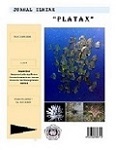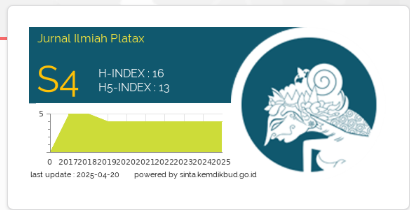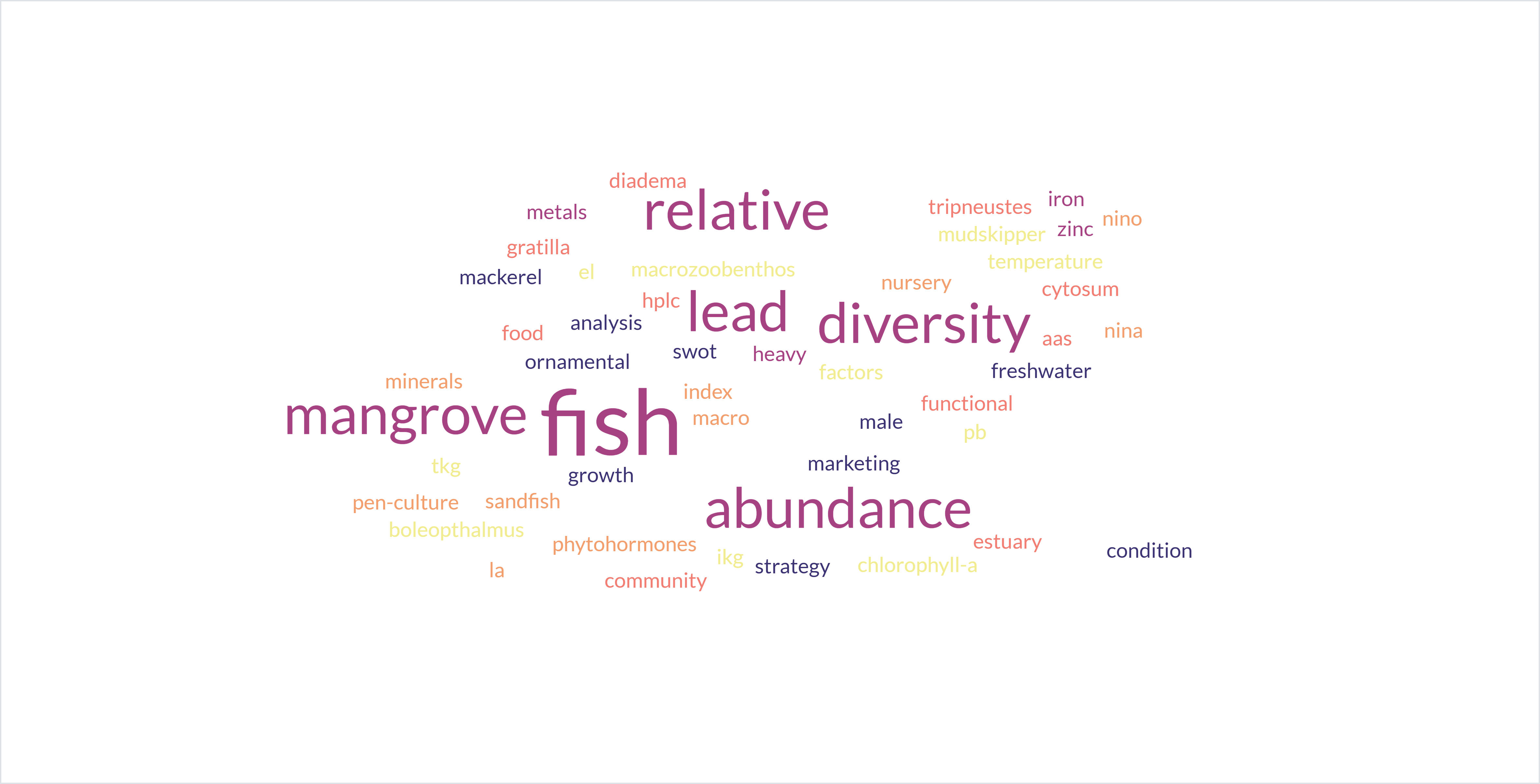Heavy Metal (Ni, Fe) Concentration in Water and Histopathological of Marine Fish in the Obi Island, Indonesia.
DOI:
https://doi.org/10.35800/jip.8.2.2020.30673Keywords:
Water quality, Heavy Metal, Pollution, Histopathological, Obi Island.Abstract
This study aims to determine the content of nickel (Ni) and iron (Fe) as well as histopathological analysis of marine fish in Obi Island waters as a bioindicator of pollution. Besides, water quality conditions were carried out in-situ and ex-situ observations. The parameters observed were temperature, brightness, salinity, pH, dissolved oxygen, nitrate, orthophosphate, ammonia, iron (Fe), and nickel (Ni). The results showed the temperature range between 26.48 ℃ to 27.99 ℃ below the quality standard or low temperature. The brightness of the relationship between 12 m and 13 m is under quality standards. The salinity range between 31.01 ppt to 32.13 ppt below the quality standard. The pH range is from 8.6 to 8.7 in high or alkaline conditions. Ammonia range between 0.4 mg / L to 0.7 mg / L exceeds the quality standard. The range of nitrate between 0.009 mg / L to 0.012 mg / L exceeds the quality standard. The range of phosphate between 0.016 mg / L to 0.019 mg / L exceeds the quality standard. The DO range between 3.68 mg / L to 3.77 mg / L lower than the quality standard. The metal range of 0.6 mg / L to 0.9 mg / L exceeds the quality standard. The range of Ni metal between 0.06 mg / L to 0.09 mg / L exceeds the quality standard. Histopathological analysis showed that the liver had a hemorrhage, degeneration of blood vessels, vacuolate degeneration, necrosis, or cell death. The muscles experience edema, degeneration of muscle fibers, atrophy of muscle bundles, vacuolar degeneration of muscle Bundles, hemorrhage, infiltration of lymphocytes, and necrosis. The intestine experience infiltration of lymphocytes, melanomacrophages, and necrosis. While P. tayenus fish ovaries showed necrosis structure oocytes. This research can be a reference for warning of heavy metal pollution in Obi Island waters, binding to the nature of heavy metals that can accumulate in fish tissue.
Keywords: Water quality; Heavy Metal; Pollution; Histopathological; Obi Island.
References
Abbaspour N, Hurrell R, Kelishadi R (2014). Review on iron and its importance for human health. J Res Med Sci.19 : 164-174.
Abdel-Warith AA, Younis EM, Al-Asgah NA, Wahbi OM (2011) Effect of zinc toxicity on liver histology of Nile Tilapia Oreochromis niloticus. Sci Res Essays 6 : 3760–3769
Ahmed ASS, Sultana S, Habib A, Ullah H, Musa N, Hossain MB, Rahman MM, Sarker MSI (2019) Bioaccumulation of heavy metals in some commercially important fishes from a tropical river estuary suggests higher potential health risk in children than adults. PLoS ONE, 14(10): 0219336. DOI: 10.1371/journal.pone.0219336
Al-Masri M, Aba S, Khalil AH, Al-Hares Z (2002) Sedimentation rates and pollution history of a dried lake. Sci. Total Environ. 293: 177-189. DOI: 10.1016/S0048-9697(02)00013-X
Ali H, Khan E, Ilahi I (2019) Environmental Chemistry and Ecotoxicology of Hazardous Heavy Metals: Environmental Persistence, Toxicity, and Bioaccumulation. Journal of Chemistry, DOI: 10.1155/2019/6730305
Alipour H, Poukhabbaz A, Hassanpour M (2015) Estimation of potential health risk for some metallic elements by consumption of fish. Water Qual Expo Health 7(2):179–85. DOI: 10.1007/s12403-014-0137-3
Askary-Sary, A. Beheshti, M. Cadmium, iron, lead and mercury bioaccumulation in Abu Mullet, Liza abu, different tissues from Karoun and Karkheh Rivers, Khozestan, Iran. Bull. Environ. Contam. Toxicol. 88(2) : 158-161. DOI: 10.1007/s00128-011-0476-8
Athikesavan S, Vincent S, Ambrose T, Velmurugan B (2006) Nickel induced histopathological changes in the different tissues of freshwater fish, Hypophthalmichthys molitrix (Valenciennes). Journal of Environmental Biology, 27(2): 391-395
Authman MMN, Zaki MS, Khallaf EA, Abbas HH (2015) Use of Fish as Bio-indicator of the Effects of Heavy Metals Pollution. J Aquac Res Development 6(4). DOI: 10.4172/2155-9546.1000328. https://www.longdom.org/open-access/use-of-fish-as-bioindicator-of-the-effects-of-heavy-metals-pollution-2155-9546-1000328.pdf
Bhatkar NV (2011) Chromium, Nickel and Zinc Induced Histopathological Alterations in the Liver of Indian Common Carp Labeo rohita (Ham.). JASEM, 15(2): 331 – 336
Biswas S, Ghosh AR (2016) Lead induced histological alterations in ovarian tissue of freshwater teleost Mastacembelus pancalus (Hamilton). International Journal of Advances in Scientific Research, 2(01): 045-051
Buxton S, Garman E, Heim KE, Lyons-Darden T, Schlekat CE, Taylor MD, Oller AR (2019). Concise Review of Nickel Human Health Toxicology and Ecotoxicology. Inorganics, 7(89): 1-38. DOI: 10.3390/inorganics7070089
Boyd CE, Pine H (2010) Application of agrometeorology to aquaculture and fisheries. In: Guide to Agricultural Meteorological Practices (GAMP), Chapter 13. (PP. 1–25). Geneva, Switzerland: World Meteorological Organization. https://www.wmo.int/pages/prog/wcp/agm/gamp/documents/WMO_No134_en.pdf
Brochin R, Leone S, Phillips D, Shepard N, Zisa D, Angerio A (2008) The Cellular Effect of Lead Poisoning and Its Clinical Picture. The Georgetown Undergraduate J. Health Sci. 5(2).
Camargo MMP, Martinez CBR (2007) Histopathology of gills, kidney and liver of a neotropical fish caged in an urban stream. Neotrop Ichthyol. 5(3): 327–336
Cao J, Wang G, Wang T, Chen J, Wenjing G, Wu P, He X, Xie L (2019) Copper caused reproductive endocrine disruption in zebrafish (Danio rerio). Aquatic Toxicology, 211: 124–136. DOI: 10.1016/j.aquatox.2019.04.003
Dane H, Şïşman T (2020) A morpho-histopathological study in the digestive tract of three fish species influenced with heavy metal pollution. Chemosphere, 242: 125212. DOI: 10.1016/j.chemosphere.2019.125212
Das KK, Reddy RC, Bagoji IB, Das S, Bagali S, Mullur L, Khodnapur JP. Biradar MS (2019). Primary concept of nickel toxicity – an overview. J Basic Clin Physiol Pharmacol, 30(2): 141–152. DOI: 10.1515/jbcpp-2017-0171
Dohaish EJAB (2018) Impact of some heavy metals present in the coastal area of Jeddah, Saudi Arabia on the gills, intestine and liver tissues of Lutjanus monostigma. Journal of Environmental Biology, 39: 253-260. DOI: 10.22438/jeb/39/2/PRN-121 http://www.jeb.co.in/index.php?page=abstract&issue=201803_mar18&number=17
Effendi H (2003) Telaah Kualitas Air Bagi Pengelolaan Sumber Daya dan Lingkungan Perairan. Penerbit Kanisius. Yogyakarta. https://books.google.co.id/books?id=HyjDhfW87B0C&printsec=copyright&hl=id#v=onepage&q&f=false
El-Morshedi M, Alzahrani I, Kizilbash NA, Abdeen A, El-Shebbly A, El-Berri A (2014) Effect of Heavy Metal Pollutants on Fish Population in two Egyptian Lakes. International Journal of Advanced Research, 2(1): 408-417. (ISSN 2320-5407). www.journalijar.com http://www.journalijar.com/article/1039/effect-of-heavy-metal-pollutants-on-fish-population-in-two-egyptian-lakes/
El-Naggar AM, Mahmoud SA, Tayel SI (2009) Bioaccumulation of Some Heavy Metals and Histopathological Alterations in Liver of Oreochromis niloticus in Relation to Water Quality at Different Localities along the River Nile, Egypt. World Journal of Fish and Marine Sciences 1(2): 105-114. Corpus ID: 85932062. https://www.semanticscholar.org/paper/Bioaccumulation-of-Some-Heavy-Metals-and-in-Liver-Elnaggar-Mahmoud/32f90f4f673b4458733bcd9a493820a7cb5f79fc
Elgaml SA, Saad TT, Hamed MF, Zaki VH (2019) Effects of heavy metal pollutants on the reproduction of Nile tilapia. IJFAS, 7(5): 542-547. http://www.fisheriesjournal.com/archives/?year=2019&vol=7&issue=5&part=G&ArticleId=2027
Gorur FK, Keser R, Akcay N, et al. (2012) Radioactivity and heavy metal concentrations of some commercial fish species consumed in the Black Sea Region of Turkey. Chemosphere 87:356e61. DOI: 10.1016/j.chemosphere.2011.12.022
Hanna MI, Shaheed IB, Elias NS (2005) A Contribution on Chromium and Lead Toxicity in Cultured (Oreochromis niloticus). Egyption J. Aquat. Biol. Fish., (9): 177-209
Haredi AMM, Mourad M, Tanekhy M, Wassif E, Abdel‑Tawab HS (2020) Lake Edku pollutants induced biochemical and histopathological alterations in muscle tissues of Nile Tilapia (Oreochromis niloticus). Toxicol. Environ. Health. Sci. DOI: 10.1007/s13530-020-00042-w
Hegazi MA, El Haleim SZA, Sirdah MM, Mwafy SN (2015) Oxidative stress in liver and white muscles of Nile Tilapia as responses to polluted area in the Nile river. Egypt J Exp Biol Zool, 11: 23–36. https://www.bibliomed.org/?mno=189781
Hermenean A, Damache G, Albu P, Ardelean A, Ardelean G, Ardelean DP, Horge M, Nagy T, Braun M, Zsuga M, Kéki S, Costache M, Dinischiotu A (2015) Histopatological alterations and oxidative stress in liver and kidney of Leuciscus cephalus following exposure to heavy metals in the Tur River, North Western Romania. Ecotoxicology and Environmental Safety 119 : 198–205. DOI: 10.1016/j.ecoenv.2015.05.029
Hosseini M, Nabavi SMB, Nabavi SN, Pour NA (2015) Heavy metals (Cd, Co, Cu, Ni, Pb, Fe, and Hg) content in four fish commonly consumed in Iran: risk assessment for the consumers. Environ Monit Assess, 187:237. DOI: 10.1007/s10661-015-4464-z
Ibrahim LA, Ramzy EM (2013) Water quality and its impact on Tilapia zilli (case study) Qarun lake-Egypt. Int Water Technol J, 3: 170–191. https://pdfs.semanticscholar.org/fbd6/4042d8dac5ea551fa61472021d1af4312fcb.pdf
Javed M, Ahmad I, Usmani N, Ahmad M (2016) Studies on biomarkers of oxidative stress and associated genotoxicity and histopathology in Channa punctatus from heavy metal polluted canal. Chemosphere 151 : 210-219 DOI: 10.1016/j.chemosphere.2016.02.080
Kale VS (2016) Consequence of temperature, Ph, turbidity and dissolved oxygen water quality parameters. Int J Adv Res Sci Eng Technol, 3: 186–190. https://iarjset.com/upload/2016/august-16/IARJSET%2034.pdf
Karbassi AR, Bayati I, Moattar F (2006) Origin and chemical partitioning of heavy metals in riverbed sediments. Int. J. Environ. Sci. Technol. 3: 35-42. DOI: 10.1007/BF03325905
Kazempoor R, Asl AHK, Motallebi AA, Alaie E, Marammazi GJ, Roshani A (2015) Histopathological changes of water soluble fraction of Iranian crude oil in muscle of yellowfin sea bream (Acantopagrus latus). Int J Biosci, 6: 451–459. Corpus ID: 212583868. https://www.semanticscholar.org/paper/Int.-J.-Biosci-Kazempoor-Asl/f5e516560bf059ebbddc8eb54f9a8424a8c47d5d?p2df
Khan UA, Kujala K, Nieminen SP, Räisänen ML, Ronkanen A (2019) Arsenic, antimony, and nickel leaching from northern peatlands treating mining influenced water in cold climate. Science of the Total Environment 657: 1161–1172 DOI: 10.1016/j.scitotenv.2018.11.455
Korun, J. And G. Timur. 2008. Marine Vibrios Associated With Diseased Sea Bass (Dicentrarchus labrax) In Turkey. Journal of Fisheries Sciences. 2(1): 66-76. DOI: 10.3153/jfscom.2008
Krishnani KK, Azad IS, Kailasam M, Thirunavukkarasu AR, Gupta BP, Joseph KO, Muralidhar M, Abraham M (2003) Acute Toxicity of Some Heavy Metals to Lates calcarifer Fry with a Note on Its Histopathological Manifestations. Journal Of Environmental Science And Health, 38(4) : 645–655
Luczynska J, Paszczyk B, Luczynski MJ (2018) Fish as a bioindicator of heavy metals pollution in aquatic ecosystem of Pluszne Lake, Poland, and risk assessment for consumer’s health. Ecotoxicology and Environmental Safety, 153: 60–67. DOI: 10.1016/j.ecoenv.2018.01.057
Lupankwa, K., Love, D., Mapani, B.S., Mseka, S., 2004. Impact of a base metal slimes dam on water systems, Madziwa Mine, Mazowe Valley, Zimbabwe. Physics and Chemistry of the Earth 29, 1145–1151. DOI: 10.1016/j.pce.2004.09.017
Mansour HAA, El-kady MAH, Almaaty AHA, Ramadan AM (2018) Effect of Environmental Pollution on Gonads Histology of the Nile Tilapia, Oreochromis niloticus from Lake Manzala, Egypt. Egyptian Journal of Aquatic Biology & Fisheries, 22(5): 563–572
Mansouri B, Ebrahimpour M, Babaei H (2012) Bioaccumulation and elimination of nickel in the organs of black fish (Capoeta fusca). Toxicol. Ind. Health. 28, 361-368
Menteri Negara Lingkungan Hidup, Indonesia (2004) Keputusan Menteri Negara Lingkungan Hidup Nomor 51 Tahun 2004 tentang Baku Mutu Air Laut Untuk Biota Laut. Jakarta.
Miedico O, Ferrara A, Tarallo M, Pompa C, Bisceglia D, Chiaravalle AE (2016) Hazardous and essential trace elements profile in the different soft tissues of Lithophaga lithophaga (Linnaeus, 1758) from Southern Adriatic Sea (Italy),†Toxicological & Environmental Chemistry, 98(8): 877–885. DOI: 10.1080/02772248.2015.1128434
Naji A, Ismail A, Ismail AR (2010) Chemical speciation and contamination Assessment of Zn and Cd by sequential extraction in surface sediment of Klang River. Malaysia. Microch. Jour, 95: 285-292. DOI: 10.1016/j.microc.2009.12.015
Ojaveer H, Tomkiewicz J, Arula T, Klais R (2015) Female ovarian abnormalities and reproductive failure of autumn-spawning herring (Clupea harengus Membras) in the Baltic Sea. ICES J. Mar. Sci., 72: 2332-2340
Osman AG, Kloas W (2010) Water quality and heavy metal monitoring in water, sediments, and tissues of the African catfish Clarias gariepinus (Burchell, 1822) from the river Nile. Egypt J Environ Protect ,1: 389–400. DOI: 10.4236/jep.2010.14045
Paschoalini AL, Savassi LA, Arantes FP, Rizzo E, Bazzoli N (2019) Heavy metals accumulation and endocrine disruption in Prochilodus argenteus from a polluted neotropical river. Ecotoxicology and Environmental Safety 169 (2019) 539–550. DOI : 10.1016/j.ecoenv.2018.11.047
Poleksic V, Lenhardt M, Jaric I, Djordjevic D, Gacic Z, Cvijanovic G, Raskovic B (2010) Liver, Gills, And Skin Histopathology And Heavy Metal Content Of The Danube Sterlet (Acipenser ruthenus Linnaeus, 1758). Environmental Toxicology and Chemistry, 29(3): 515–521
Rashed MN (2001) Cadmium and Lead levels in fish (Tilapia nilotica) tissues as biological indicator for lake water pollution. Environ.Monit. and Assess. 68(1):75-89
Rose M, Fernandes A, Mortimer D, Baskaran C (2015) Contamination of fish in UK fresh water systems: Risk assessment for human consumption. Chemosphere, 122: 183-189
Rothig T, Ochsenkuhn MA, Roik A, Van Der Merwe R, Voolstra CR (2016) Long-term salinity tolerance is accompanied by major restructuring of the coral bacterial microbiome. Mol. Ecol. 25, 1308e1323. DOI: 10.1111/mec.13567
Shehata S, Ghanem MH, Ragab AM (2017) Effect of some environmental factors on the food and feeding habits of the cichlid fish, Tilapia zillii, inhabiting Lake Qarun, Egypt. Egypt Acad J Biol Sci, 9: 55–70. DOI: 10.21608/eajbsz.2017.13457. https://www.researchgate.net/publication/327693945_Effect_of_Some_Environmental_Factors_on_the_Food_and_Feeding_Habits_of_the_Cichlid_Fish_Tilapia_zillii_Inhabiting_Lake_Qarun_Egypt
Sweidan AH, El-Bendary N, Hegazy OM, Hassanien AE, Snasel V (2015) Water pollution detection system based on fish gills as a biomarker. Procedia Comput. Sci. 65: 601–611. DOI: 10.1016/j.procs.2015.09.004
Tayel SI, Ahmed NAM, EL-Hossiny MA (2014) Impact of diffused pollution on histological and hematological properties of Mugil cephalus and Mugil capito collected from lake Manzalah, Egypt. Int J Environ Sci Eng 5: 51–67. http://www.pvamu.edu/engineering/wp-content/uploads/sites/30/IJESE-vol-5-Issue-5.pdf
Thabet IA, Tawadrous W, Samy AM (2019) Pollution induced change of liver of Oreochromis niloticus: metals accumulation and histopathological response. World Journal of Advanced Research and Reviews 02(02), 025–035. DOI : 10.30574/wjarr.2019.2.2.0020
Triebskorn R, Telcean I, Casper H, Farkas A, Sandu C, Stan G, Colărescu O, Dori T, Köhler H (2008) Monitoring pollution in River Mureş, Romania, part II: Metal accumulation and histopathology in fish. Environ Monit Assess 141: 177–188. DOI: 10.1007/s10661-007-9886-9
Turkmen A, Turkmen M, Tepe YI, Akyurt I (2005). Heavy metals in three commercially valuable fish species from Iskenderun Bay, Northern East Mediterranean Sea, Turkey. Food Chemistry, 91, 167–172. DOI: 10.1016/j.foodchem.2004.08.008
USEPA (1986) Quality criteria for water EPA 440/5-86-001. United States Environmental Protection Agency, Office of Water Regulations and Standards, Washington DC.
Velusamy A, Satheesh Kumar P, Ram A, Chinnadurai S (2014) Bioaccumulation of heavy metals in commercially important marine fishes from Mumbai Harbor. India. Mar. Pollut. Bull., 81: 218e224. DOI: 10.1016/j.marpolbul.2014.01.049
Wang X, Sato T, Xing B, Tao S (2005) Health risks of heavy metals to the general public in Tianjin, China via consumption of vegetables and fish. Science of the Total Environment, 350: 28 – 37. DOI: 10.1016/j.scitotenv.2004.09.044
Wessling-Resnick M (2017) Excess iron: considerations related to development and early growth. Am. J. Clin. Nutr. 106 : 1600S–5S. DOI: 10.3945/ajcn.117.155879.
Youdim MBH (2001) Deficiency and Excess of Iron in Brain Function and Dysfunction. Nutrition Reviews, 59(8): 83-87. DOI: /10.1111/j.1753-4887.2001.tb05506.x
Downloads
Published
How to Cite
Issue
Section
License
COPYRIGHT
Authors who publish with this journal agree to the following terms:
Authors hold their copyright and grant this journal the privilege of first publication, with the work simultaneously licensed under a Creative Commons Attribution License that permits others to impart the work with an acknowledgment of the work's origin and initial publication by this journal.
Authors can enter into separate or additional contractual arrangements for the non-exclusive distribution of the journal's published version of the work (for example, post it to an institutional repository or publish it in a book), with an acknowledgment of its underlying publication in this journal.
Authors are permitted and encouraged to post their work online (for example, in institutional repositories or on their website) as it can lead to productive exchanges, as well as earlier and greater citation of the published work (See The Effect of Open Access).






































